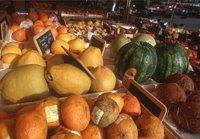
Food Justice is obviously a topic that is undeniably important . But can sustainable practices apply to the city? To where we live? How about Seattle? Can you see someone planting a sustainable community garden somewhere in the city? I can't. I looked into some examples of food justice in cities. I found a website ranking the most agriculturally sustainable cities in the country called "Sustain Lane". Seattle currently ranks number nine. Minneapolis is ranked number one on the sustainability list. I looked into what could make Seattle number one. The food "sustainablilty" of a city depends on "data from the US Department of Agriculture for farmers' markets and primary research on farmers' markets and community gardens.". Minneapolis took the top spot because of its "strong showings in both farmers markets and community gardens per capita ("Sustain Lane")" Minneapolis contains 18 markets, of which nearly half accept food stamps. This seems very impressive but thats not even it. 60-plus community gardens are also contained within the city limits. "All that and a bucket of locally grown, free-range chicken, for a city of only 373,943 residents." So I don't remember the last time I saw a community garden in Seattle. I think that being 9th isn't too bad, but we could be better. I think volunteering for a food justice program such as the "Community Coalition for Environmental Justice" located in Seattle would be a good service. It's important to realize the terrible toll of injustice that processed food is taking, especially on inner city families and kids. Overall, Mayor Greg Nichols needs to stop making promises about light rail and he needs to focus on food justice as an important city issue. It drives me crazy to think that people don't have access to foods that promote health and wellness. How can we let this go on?
-Seneca Luetke

